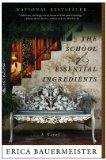Summary | Excerpt | Reading Guide | Reviews | Beyond the Book | Read-Alikes | Genres & Themes | Author Bio

This article relates to The School of Essential Ingredients
Although Lillian calls her cooking classes "The School of Essential Ingredients" and has been asked what those are, she doesn't keep a list of them, nor are any of her recipes written down. While she does acknowledge that baking requires a more carefully balanced set of ingredients (she also believes that couples should make their own wedding cakes "as part of preparation for their lives together"), cooking allows considerably more freedom. Cooking is "all about preference."
Most of us are used to a kind of cooking that begins with recipes: a list of measured ingredients and instructions on what to do with them and when to do it. There may be some variations included, but it all seems more to do with science than taste. It may look like progress, but is it?
Helen Worth's 1959 book
Cooking Without Recipes (Harper & Row) wants her readers
"to think of cooking as an art based on a science, and to make [their] kitchen [their] laboratory." But she also writes:
"Since civilization began, cooks have made love to their families with food. Your kitchen makes you part of that past—and opens the door to a future where you too can set your table with meals that comfort and sustain, delight and cheer." There's a lot of Helen Worth in Lillian.
Depending on your age, if you go back far enough, some women in your family cooked by feel, not by recipe. Recipes existed in the head and, even when written down, were often confusing to the next generation.
Much has already been written about the immortal question: what is a pinch anyway? Or a dash? Measuring spoons now exist to replicate what cooks used to know instinctively. My maternal grandmother's much loved Milk Pie died when she did because no one had learned from her how to make it and what written recipe existed never turned out the way it was remembered. It was the same for my other grandmother's Cornstarch Pudding (gently sweet and smoothly bland, topped by gorgeous meringue),
that she always contributed when there was an illness in the family. We found
recipes for many other things, but not for that.
"Our Food Roots" (February/March 2009 Hallmark Magazine) features the experiences of the children of immigrant
families in trying to keep recipes from the homelands alive. All mention the lack of written recipes as one difficulty
they've faced; another is finding all of the proper ingredients. Yet they persist, often with the assistance of others,
and create their own versions of family favorites. And that may be the answer to this quandary: experiment, improvise,
provide a written guide for future cooks, and don't be afraid to make your own improvements or mistakes because you'll
learn something new every time – and you'll keep connected with the past.
Filed under Cultural Curiosities
![]() This "beyond the book article" relates to The School of Essential Ingredients. It originally ran in February 2009 and has been updated for the
January 2010 paperback edition.
Go to magazine.
This "beyond the book article" relates to The School of Essential Ingredients. It originally ran in February 2009 and has been updated for the
January 2010 paperback edition.
Go to magazine.
Your guide toexceptional books
BookBrowse seeks out and recommends the best in contemporary fiction and nonfiction—books that not only engage and entertain but also deepen our understanding of ourselves and the world around us.